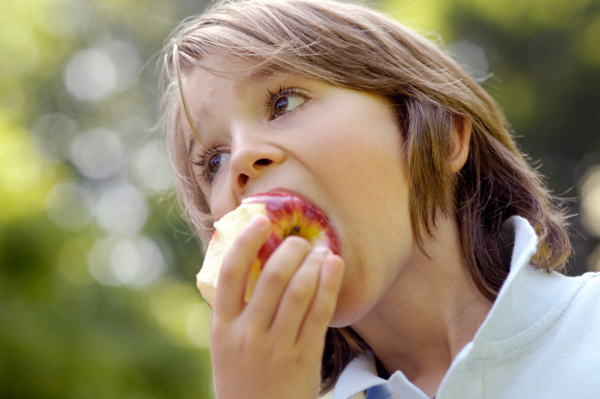
When a child's body is fueled with the right foods and plenty of water, it can do amazing things! Kids who eat right have an easier time concentrating, have increased energy and are able to perform better both mentally and physically. With busy school days and extracurricular activities and sports, it's crucial that kids eat smart to learn well and play hard.
The wrong foods can slow kids down and make them feel tired. There's also a growing concern about childhood obesity and diabetes that relates to poor eating habits. Better nutrition helps mental development while building strong bones and lean muscle. It all starts with a good breakfast, and no child should skip this meal! Fruits and grains like oatmeal fuel kids for the busy day ahead.
Sugary snacks between meals don't make the grade. They can spike energy temporarily, but have little nutritional value. Fruits, veggies and nutrient-rich foods are the right choices. Granola bars, apple wedges, string cheese, lean chicken, fruit smoothies and similar choices help keep energy and attention spans up. A combination of proteins, whole grains, fruits and vegetables release their energy more slowly than pure sugar, so energy levels are consistent.
Snack time
For most children, the right formula means that the body is fueled regularly to avoid energy slumps. Aim for three meals a day plus healthy snacks midmorning, in the middle of the afternoon and following strenuous activity like playing soccer or riding bikes. Eating a high-carbohydrate snack within an hour of the physical activity will speed up energy recovery. Fruit with protein like cheese or meat, or a cereal bar, are good options after strenuous exercise.
Pack it up
Make it easy for your kids to snack smart. Prepare some snacks that are easy to grab and go when kids head out the door for sports and other activities. Small bottles of water are a must to keep them hydrated and quench thirst. Baggies of precut vegetable wedges — cucumber, peppers, carrots, broccoli — can be munched to satisfy hunger. Fill a small container with fruit sections, slices of cheese and some wheat crackers for bite-sized snacks. Granola bars can be tucked in a pocket to pull out when energy lags. Make sure that you provide a mini-meal with good nutritional value. Whenever possible, choose fresh seasonal produce: fruits and vegetables that taste great and provide the vitamins and minerals growing little bodies crave. It's a great way to add variety to daily snacks, too — crisp apples, juicy pears, oranges, apricots, peaches and an abundant selection of colorful veggies. Mix up a smoothie with fresh berries and low-fat milk, or offer up a chunky chicken salad with zest from grapes and celery chunks to spread on pita chips.
Watch: Making healthy after-school snacks
More tips
How to instill smart eating habits in kids
Helping kids develop healthy eating habits
Teaching your kids to make better lunchtime decisions